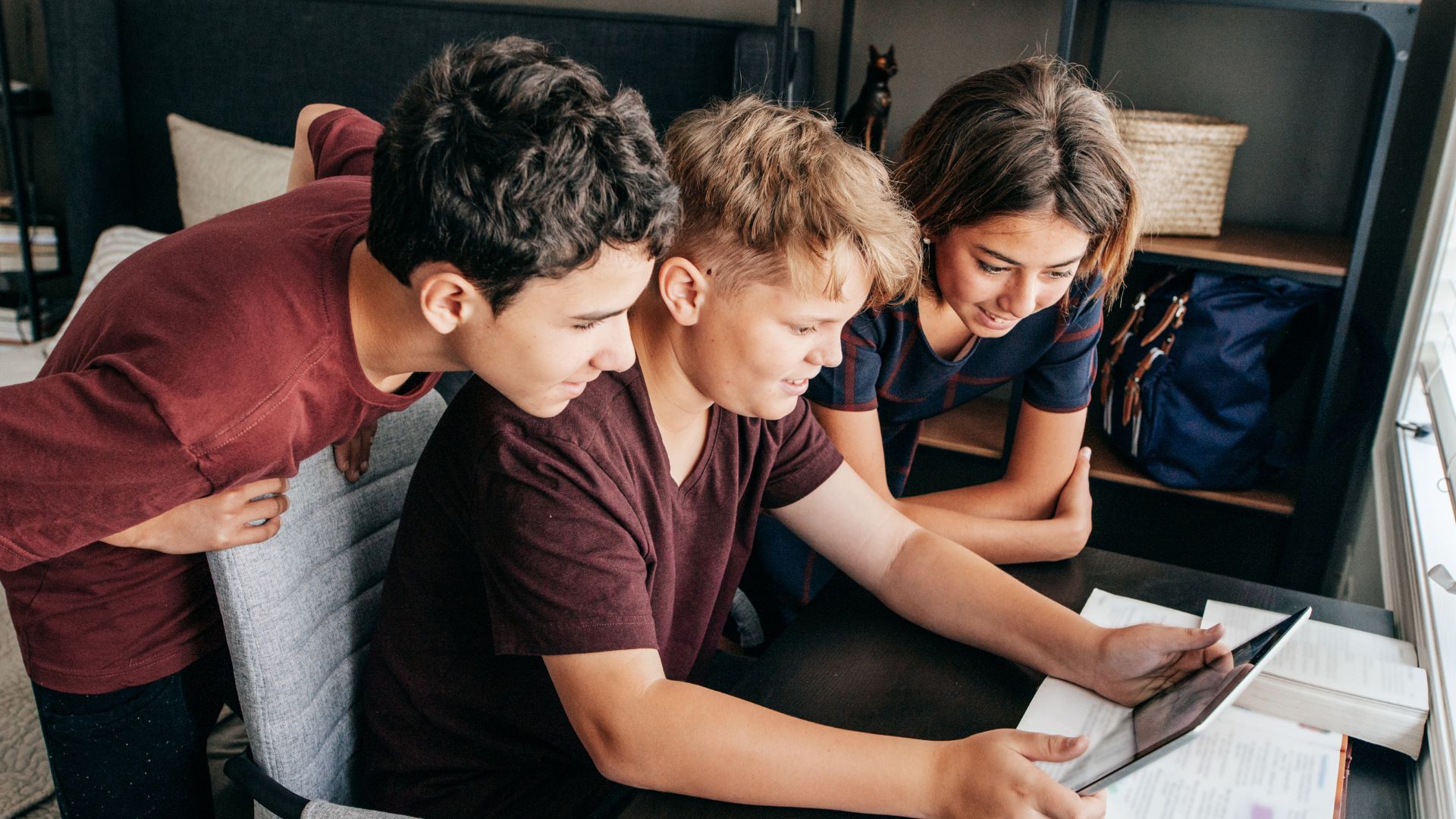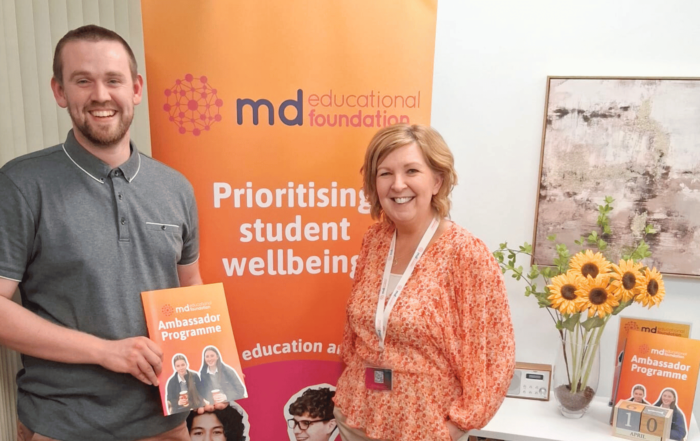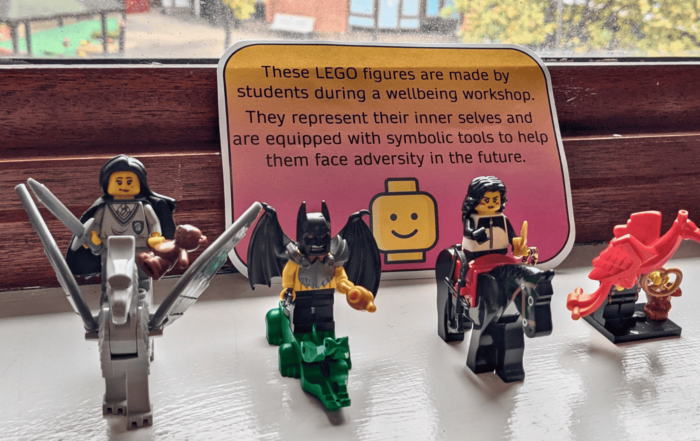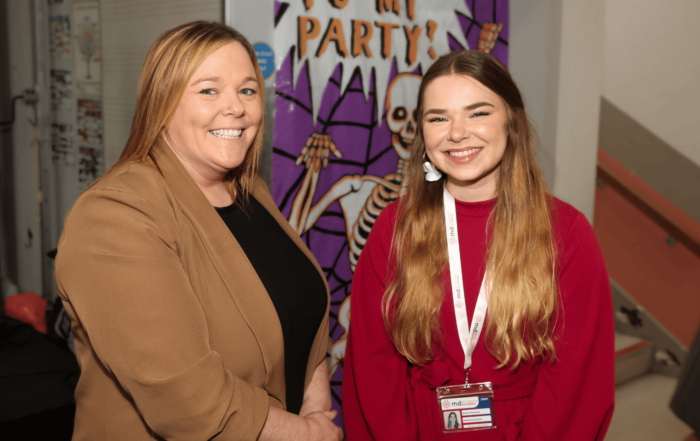In today’s hyper-connected world, social media has become a standard part of the daily lives of young people. Born into the age of technology and social media, GenZ has embraced platforms like Facebook, Instagram, Twitter, TikTok, Snapchat, Twitter/X and many more. In the United Kingdom in 2021, 97 percent of young people aged between 16 and 17 years old used social media (Statista, 2022) – using the platforms for connection, self-expression, information sharing and research. While these digital platforms offer incredible and never-ending opportunities for communication and community-building, they also pose unique and complex challenges that impact the mental health and wellbeing of our youth.
In this blog, we will explore both the positive and negative aspects of social media usage when it comes to young people’s wellbeing and mental health. Hearing thoughts from multiple professionals in the mental health and wellbeing field. We’ll also share some strategies and tips that can help guide young people to healthier and safer social media usage and improved relationships with technology. How can we keep prioritising the wellbeing and mental health of our young people in this social media-focused world?
What are the challenges young people face when using social media?
While the world of digitalisation and social media comes with many positives, it also raises several risks and challenges for our wellbeing and mental health. From cyberbullying and harassment to constant pressure to look and be a certain way, graphic images and an overwhelming number of news outlets making information instantly available across the globe.
These kinds of challenges on social media can cause stress and a poor self-image, alongside physical risks. Alex Wallace, Founder of The Mintridge Foundation – a charity harnessing the power of sporting role models to positively influence young people – expressed concern about how young people’s sense of self-worth can be impacted by social media, especially if they are seeking validation and acceptance through ‘Likes’. Kadra Abdinasir, Associate Director of Children and Young People’s Mental Health for CFMH & Strategic Lead for CYPMHC continued this by describing the ‘compare and despair’ mindset created when young people spend a lot of time looking at images on social media. She also spoke about how social media creates ‘the perfect storm’ for the development of negative mindsets.
Even young people themselves recognise that social media has its downfalls: 51% of social media users aged 16-24 in the UK thought they spend too much time on social. However, 69% of internet users agreed that the benefits of being online outweigh the risks (Ofcom, 2023).
What are the positives of social media for young people?
Alex Wallace said, “There are positive benefits of social media. Social platforms increase the visibility of marginalised groups, allowing young people to discover more about other people and broaden their interests”. At its best, social media can indeed have positive benefits and be an incredible tool for finding communities, entertainment, educational resources, 24/7 support, creative expression opportunities and worldwide networks. While it’s important to acknowledge the potential challenges and risks that come with social media, it’s equally essential to recognise the positive aspects and impact it brings to the lives of young people.
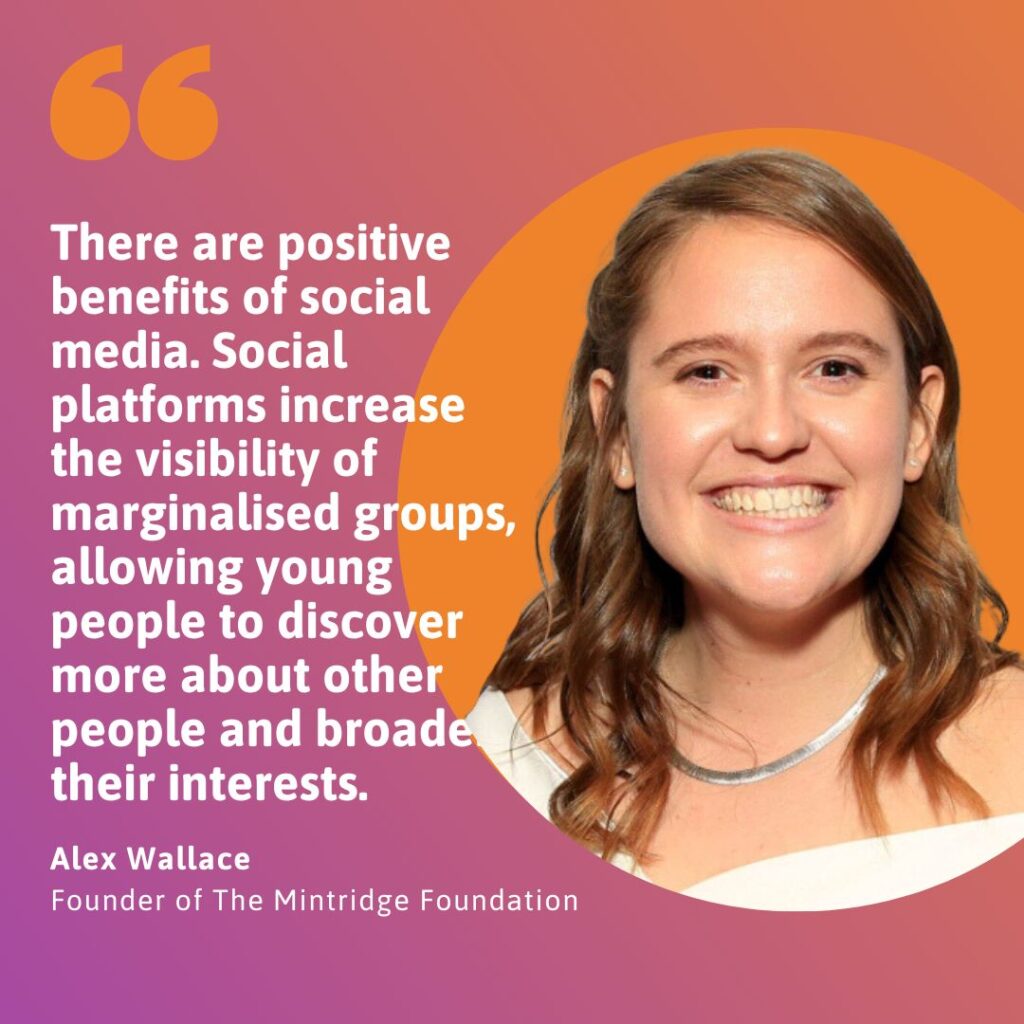
Social media platforms offer a great range of benefits that can contribute to mental health and wellbeing. According to a survey created by Ofcom, nearly 8 in 10 internet users aged 16-24 had been online to support their wellbeing – the most popular activities being looking up health symptoms, relaxation, healthy eating and nutrition.
The struggle with social media comes when we try to strike a balance between the time we spend on digital platforms and how we use them. It divides opinions when we try to see whether social media has more of a positive or negative impact on our mental health. In Ofcom’s survey, 35% of users agreed that digital platforms have a positive impact on their mental health and 24% disagreed – however, 40% neither agreed nor disagreed. How then, can we help young people navigate through social media while taking care of their mental health and wellbeing?
How can we help our young people use social media in a healthy way?
As GenZ and young people in general are digital natives, they are already skilled at recognising the dangers and benefits of social media and the digital world. Jo Holmes -Children, Young People & Families Lead at the BACP, said that “young people need opportunities to break down and explore issues themselves and find their own solutions. Adults and policymakers have a significant role to play in modelling better online behaviour themselves”. It is important that we actively support young people in taking care of their wellbeing and provide early prevention to minimise the risks of negative effects of social media.
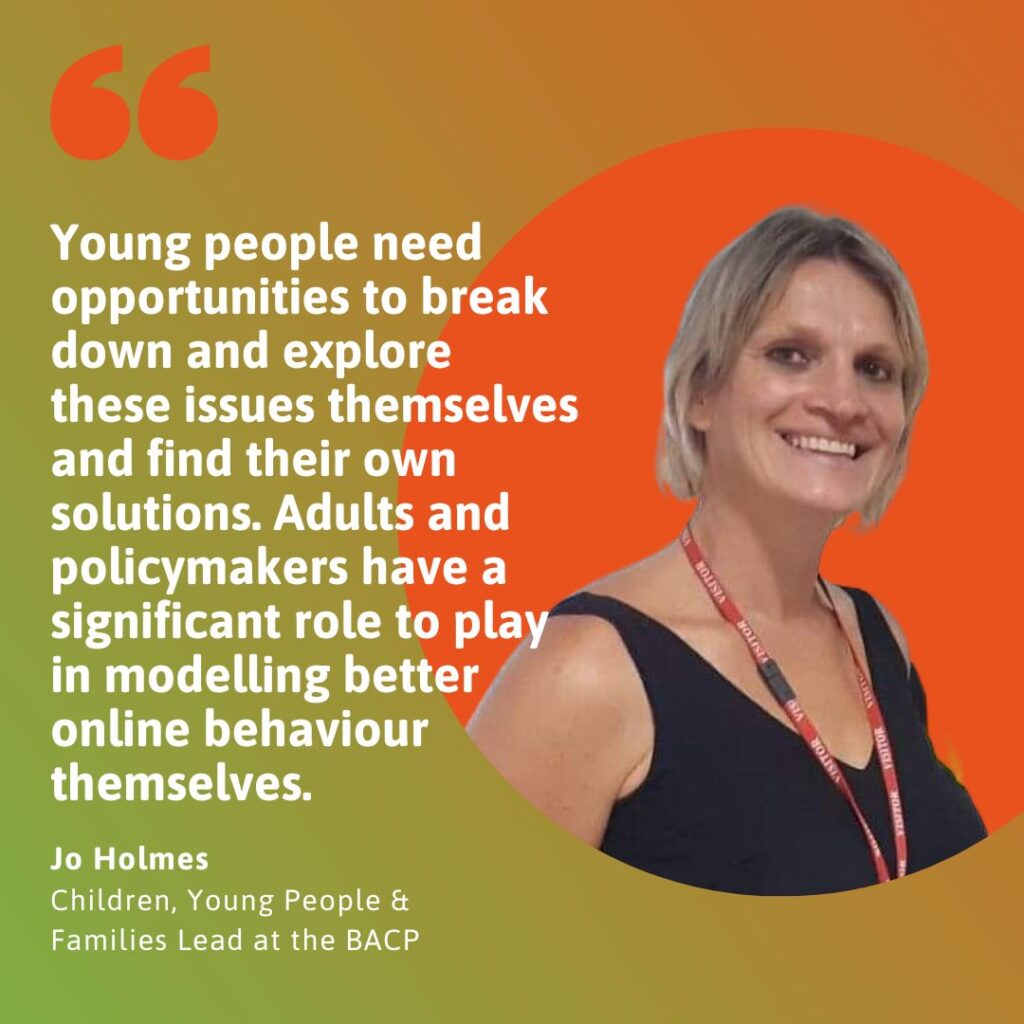
The most recent and impactful news across the world of internet and social media safety has been the passing of The Online Safety Bill in the UK and how it is now ready to become law. This law will protect our young people as they browse in the online world by placing new duties on social media companies. It’s a brilliant way to make sure our young people and their mental health and wellbeing are being supported and protected within the world of social media usage.
Catherine Llewelyn, Clinical Supervisor at mdeducational foundation – a charity prioritising student wellbeing by providing educational settings with fully funded wellbeing support – shared her thoughts about the new Online Safety Bill and how we can support young people and their wellbeing around the use of social media.
“We can and do offer support to young people in and around their online use, not only through education on online safety but also acknowledging the benefits to the wellbeing of young people when interacting with others online.
The main purpose of the Online Safety Bill is for children and young people to be better protected from harmful content that may promote harmful behaviours. It could certainly be seen as a stepping stone to a world where the advantages of being online for young people are no longer compromised by harmful or illegal content.
Our Wellbeing Leads at mdeducational foundation play a key role in the prevention of harm through education and early intervention. Using drop-in sessions or group work to raise awareness of potential risks from harmful content and how to keep safe when roaming the online arena. As well as promoting the benefits of certain online content or social media for young people, for example, the use of a wellbeing app or messaging board specifically aimed at catering for the wellbeing needs of young people.
Whilst The Online Safety Bill may not solve all the issues that children and young people face when accessing online content, it’s a great start towards being able to regulate social media platforms more succinctly and keep young users as safe as possible.”
The new law is a huge step towards healthier and safer social media usage for our young people. However, as Catherine mentioned, there are other things we can do to help. We can make sure that we’re providing young people with much needed professional resources, educate them about the benefits and risks of social media and offer strategies for healthier social media usage.
Here are 5 strategies to ensure healthier social media usage:
- Use mindful consumption: António Ferreira – a mental health activist and expert through lived experience, public speaker, disruptor, and anti-racism campaigner – shared his analogy. He suggested that “young people should view their social media usage like a “digital diet”. It’s about how you spend your time online, not how much.” António outlined, “in the same way that a balanced plate of food would include protein, carbohydrates and vegetables, we should aim to balance our digital time. For example, allocating a portion of time for education, entertainment, speaking with friends, etc.”
- Schedule screen time: Many young people recognise that they spend too much time on social media and are already taking breaks away from it. It’s a good idea to schedule screen time across the day and avoid scrolling mindlessly for hours on end. It’s important to set boundaries for social media usage so that it doesn’t take control – if it makes you feel upset or triggered, that suggests it’s time to get offline and take some personal time.
- Seek support: Kadra Abdinasir also said, “the lack of structural mental health support – such as community hubs – in the real world, is one of the main reasons young people are turning to social media for help.” There are endless resources and support services available to provide help as needed. For example, Childline – a free, private and confidential service where you can talk about anything – online, on the phone, anytime.
- Spread positivity: Being part of the online community – comes with the responsibility of being kind. Engaging with social media means that we have to practice self-awareness and take others into consideration. Sometimes it’s hard to remember that on the other side of the screen is just another human being with real emotions. Be the source of positivity and uplift others to create a nice, safe online environment for all.
- Participate in offline activities: While there are several benefits that young people get from social media and online activities, it’s as important to foster offline activities and connections in person. It’s good to take time to reconnect with loved ones, set social media aside and encourage others to do so as well. Strive for a balance between online and offline life.
![António Ferreira [link] – a mental health activist and expert through lived experience, public speaker, disruptor, and anti-racism campaigner António Ferreira - a mental health activist and expert through lived experience, public speaker, disruptor, and anti-racism campaigner](https://mdeducationalfoundation.org/wp-content/uploads/2023/10/Roundtable-quotes-Antonio-1024x1024.jpg)
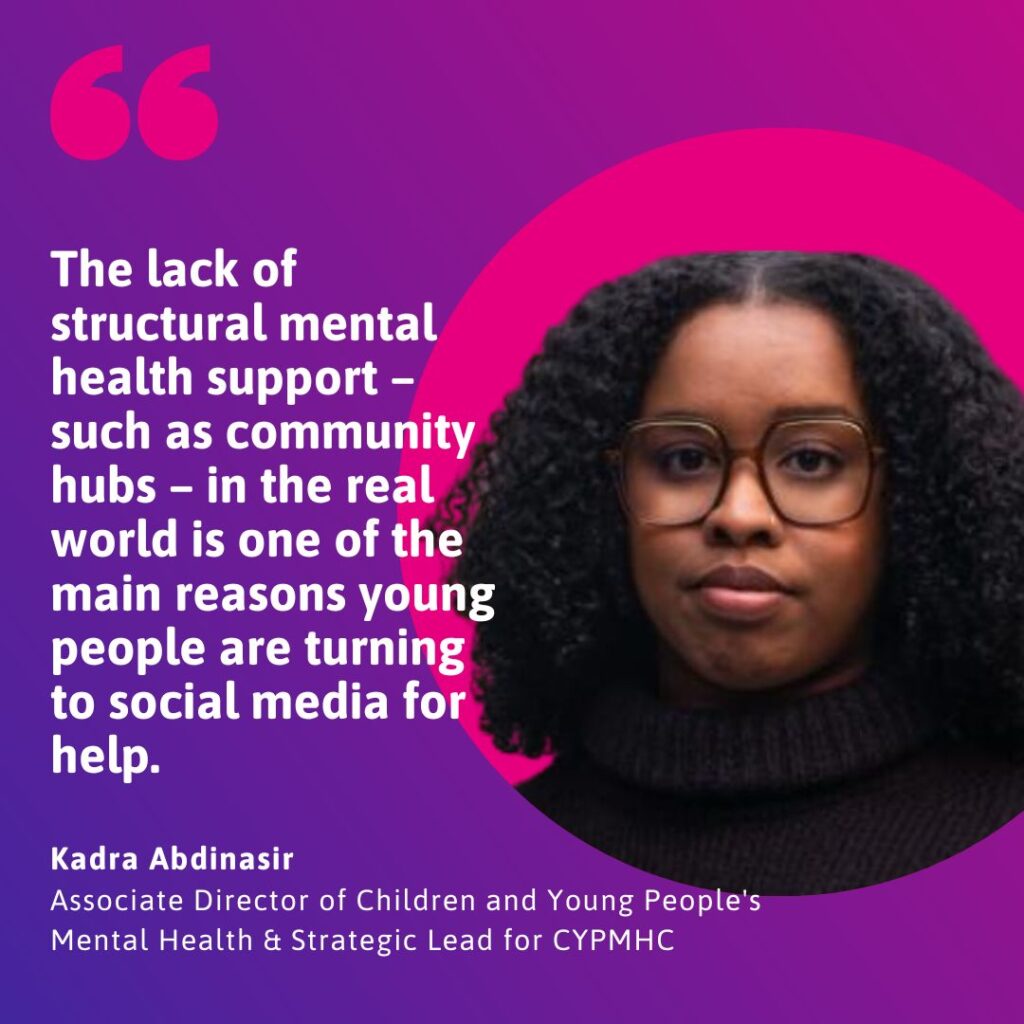
Navigating through the digital world can be tricky. Embracing digital wellbeing and safety is not about restricting, but it’s empowering and fostering fulfilling social media experiences for our youth. Through these strategies and steps, we make sure that social media has a positive impact on our young people and that it prioritises their mental health and wellbeing.
Prioritising student wellbeing through education and beyond
mdeducational foundation is a charity that provides a three-year salary-funded commitment to placing dedicated wellbeing professionals within educational settings, enabling them to kickstart their long-term wellbeing strategies.
Related posts
Championing student wellbeing: Meet James Sweeney, the first mdeducational foundation Ambassador
At mdeducational foundation, we’re committed to prioritising student wellbeing - and now, we’re continuing that mission by inviting members of our community to join us in championing a brighter future for young people. We’re [...]
6 mental health workshops to support and improve the wellbeing of young people in schools
Wellbeing workshops are a great way to promote positive wellbeing, encourage young people to look after their mental health and remove the stigma around mental health and wellbeing. In schools, workshops can provide many [...]
Shining the spotlight on student wellbeing: Meet Susanna Neuvonen, Marketing Executive at mdeducational foundation
At mdeducational foundation, we’re dedicated to prioritising student wellbeing by providing fully funded support in schools and educational settings across the UK and Ireland. Our mission is to ensure that all post-16 students feel supported [...]
